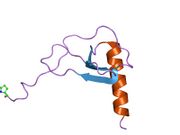Biology:CCL8
 Generic protein structure example |
Chemokine (C-C motif) ligand 8 (CCL8), also known as monocyte chemoattractant protein 2 (MCP2), is a protein that in humans is encoded by the CCL8 gene.[1][2]
CCL8 is a small cytokine belonging to the CC chemokine family. The CCL8 protein is produced as a precursor containing 109 amino acids, which is cleaved to produce mature CCL8 containing 75 amino acids. The gene for CCL8 is encoded by 3 exons and is located within a large cluster of CC chemokines on chromosome 17q11.2 in humans.[2][3] MCP-2 is chemotactic for and activates many different immune cells, including mast cells, eosinophils and basophils, (that are implicated in allergic responses), and monocytes, T cells, and NK cells that are involved in the inflammatory response.[4][5] CCL8 elicits its effects by binding to several different cell surface receptors called chemokine receptors. These receptors include CCR1, CCR2B, CCR3 and CCR5.[5][6]
CCL8 is a CC chemokine that utilizes multiple cellular receptors to attract and activate human leukocytes. CCL8 is a potent inhibitor of HIV1 by virtue of its high-affinity binding to the receptor CCR5, one of the major co-receptors for HIV1.[7] In addition, CCL8 attributes to the growth of metastasis in breast cancer cells. The manipulation of this chemokine activity influences the histology of tumors promoting steps of metastatic processes.[8] CCL8 is also involved in attracting macrophages to the decidua in labor.[9]
References
- ↑ "Entrez Gene: chemokine (C-C motif) ligand 8". https://www.ncbi.nlm.nih.gov/sites/entrez?Db=gene&Cmd=ShowDetailView&TermToSearch=6355.
- ↑ 2.0 2.1 "The human MCP-2 gene (SCYA8): cloning, sequence analysis, tissue expression, and assignment to the CC chemokine gene contig on chromosome 17q11.2". Genomics 40 (2): 323–31. March 1997. doi:10.1006/geno.1996.4594. PMID 9119400.
- ↑ "Structural and functional identification of two human, tumor-derived monocyte chemotactic proteins (MCP-2 and MCP-3) belonging to the chemokine family". J. Exp. Med. 176 (1): 59–65. July 1992. doi:10.1084/jem.176.1.59. PMID 1613466.
- ↑ "Human monocyte chemotactic proteins-2 and -3: structural and functional comparison with MCP-1". J. Leukoc. Biol. 59 (1): 67–74. January 1996. doi:10.1002/jlb.59.1.67. PMID 8558070.
- ↑ 5.0 5.1 "Monocyte chemotactic protein-2 activates CCR5 and blocks CD4/CCR5-mediated HIV-1 entry/replication". J. Biol. Chem. 273 (8): 4289–92. February 1998. doi:10.1074/jbc.273.8.4289. PMID 9468473.
- ↑ "Functional expression of CCL8 and its interaction with chemokine receptor CCR3". BMC Immunol 18 (1): 54. 2017. doi:10.1186/s12865-017-0237-5. PMID 29281969.
- ↑ PDB: 1ESR; "Complete crystal structure of monocyte chemotactic protein-2, a CC chemokine that interacts with multiple receptors". Biochemistry 39 (46): 14075–81. November 2000. doi:10.1021/bi0009340. PMID 11087354.
- ↑ "A CCL8 gradient drives breast cancer cell dissemination". Oncogene 35 (49): 6309–6318. 2016. doi:10.1038/onc.2016.161. PMID 27181207.
- ↑ "Identification of chemokines associated with the recruitment of decidual leukocytes in human labour: potential novel targets for preterm labour". PLOS ONE 8 (2): e56946. 2013. doi:10.1371/journal.pone.0056946. PMID 23451115. Bibcode: 2013PLoSO...856946H.
External links
- Human CCL8 genome location and CCL8 gene details page in the UCSC Genome Browser.
Further reading
- "Synergistic up-regulation of MCP-2/CCL8 activity is counteracted by chemokine cleavage, limiting its inflammatory and anti-tumoral effects.". Eur. J. Immunol. 39 (3): 843–57. 2009. doi:10.1002/eji.200838660. PMID 19224633.
- "CCL8/MCP-2 is a target for mir-146a in HIV-1-infected human microglial cells.". FASEB J. 24 (7): 2292–300. 2010. doi:10.1096/fj.09-143503. PMID 20181935.
- "Racial disparity in pathophysiologic pathways of preterm birth based on genetic variants.". Reprod. Biol. Endocrinol. 7: 62. 2009. doi:10.1186/1477-7827-7-62. PMID 19527514.
- "Polymorphisms in innate immunity genes and patients response to dendritic cell-based HIV immuno-treatment.". Vaccine 28 (10): 2201–6. 2010. doi:10.1016/j.vaccine.2009.12.056. PMID 20056178.
- "Common variation in genes related to innate immunity and risk of adult glioma.". Cancer Epidemiol. Biomarkers Prev. 18 (5): 1651–8. 2009. doi:10.1158/1055-9965.EPI-08-1041. PMID 19423540.
- "Polymorphisms in innate immunity genes and risk of childhood leukemia.". Hum. Immunol. 71 (7): 727–30. 2010. doi:10.1016/j.humimm.2010.04.004. PMID 20438785.
- "Preterm birth in Caucasians is associated with coagulation and inflammation pathway gene variants.". PLOS ONE 3 (9): e3283. 2008. doi:10.1371/journal.pone.0003283. PMID 18818748. Bibcode: 2008PLoSO...3.3283V.
- "CCL8/MCP-2 association analysis in patients with Alzheimer's disease and frontotemporal lobar degeneration.". J. Neurol. 256 (8): 1379–81. 2009. doi:10.1007/s00415-009-5138-y. PMID 19415413.
- "Genetic susceptibility to respiratory syncytial virus bronchiolitis in preterm children is associated with airway remodeling genes and innate immune genes.". Pediatr. Infect. Dis. J. 28 (4): 333–5. 2009. doi:10.1097/INF.0b013e31818e2aa9. PMID 19258923.
- "CCL genes in multiple sclerosis and systemic lupus erythematosus.". J. Neuroimmunol. 200 (1–2): 145–52. 2008. doi:10.1016/j.jneuroim.2008.05.016. PMID 18602166.
- "Evaluating the potential of IP-10 and MCP-2 as biomarkers for the diagnosis of tuberculosis.". Eur. Respir. J. 32 (6): 1607–15. 2008. doi:10.1183/09031936.00055508. PMID 18684849.
- "Polymorphisms in the estrogen receptor 1 and vitamin C and matrix metalloproteinase gene families are associated with susceptibility to lymphoma.". PLOS ONE 3 (7): e2816. 2008. doi:10.1371/journal.pone.0002816. PMID 18636124. Bibcode: 2008PLoSO...3.2816S.
- "Genetic variants of CC chemokine genes in experimental autoimmune encephalomyelitis, multiple sclerosis and rheumatoid arthritis.". Genes Immun. 11 (2): 142–54. 2010. doi:10.1038/gene.2009.82. PMID 19865101.
- "Upregulation of mitochondrial uncoupling protein-2 by the AMP-activated protein kinase in endothelial cells attenuates oxidative stress in diabetes.". Diabetes 57 (12): 3222–30. 2008. doi:10.2337/db08-0610. PMID 18835932.
- "Risk of meningioma and common variation in genes related to innate immunity.". Cancer Epidemiol. Biomarkers Prev. 19 (5): 1356–61. 2010. doi:10.1158/1055-9965.EPI-09-1151. PMID 20406964.
- "Spontaneous preterm birth in African Americans is associated with infection and inflammatory response gene variants.". Am. J. Obstet. Gynecol. 200 (2): 209.e1–27. 2009. doi:10.1016/j.ajog.2008.08.051. PMID 19019335.
- "Macrophage-specific metalloelastase (MMP-12) truncates and inactivates ELR+ CXC chemokines and generates CCL2, -7, -8, and -13 antagonists: potential role of the macrophage in terminating polymorphonuclear leukocyte influx.". Blood 112 (8): 3455–64. 2008. doi:10.1182/blood-2007-12-129080. PMID 18660381.
- "CCL8 is a potential molecular candidate for the diagnosis of graft-versus-host disease.". Blood 111 (8): 4403–12. 2008. doi:10.1182/blood-2007-06-097287. PMID 18256320.
- "Interleukin-9 polymorphism in infants with respiratory syncytial virus infection: an opposite effect in boys and girls.". Pediatr. Pulmonol. 45 (6): 608–13. 2010. doi:10.1002/ppul.21229. PMID 20503287.
 |

